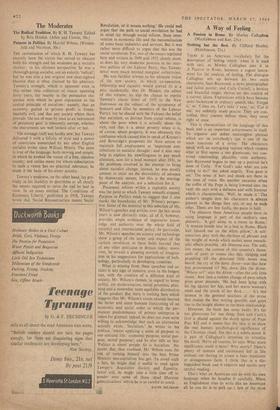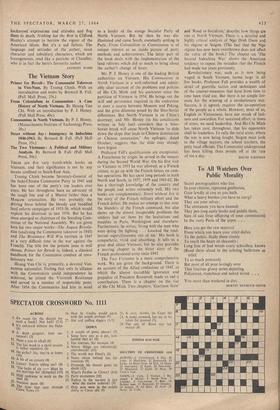A Way of Feeling
A Passion in Rome. By Morley Callaghan. (MacGibbon and Kee, 25s.) Nothing but the Best. By Clifford Hanley. (Hutchinson, 21s.) •
THERE is an American vocabulary for the description of feeling which, when it is used with tact, as Morley Callaghan uses it in A Passion in Rome, becomes a cogent instru- ment for the analysis of feeling. The dialogue Callaghan sets up between his two main characters, Sam Raymond, a news photographer and failed painter, and Carla Carneli, a broken and beautiful singer, thrives on this control of a current idiom. Expressions which have become quite hackneyed -in ordinary speech, like, 'Forget it,' or, 'Come on. Let's take it easy,' or, `Cut it out,' are suddenly made precise. They are con- trolled, their context defines them, they seems right at once.
This is characteristic of the language of this book and is an important achievement in itself. To organise and define meaningless phrasei which are on everybody's lips is one of the main functions of a writer. The characters speak with an easy-going realism which renders what at first scorns a too glamorous, too con- trived relationship, plausible, even authentic. Sam Raymond begins to tear up a portrait he's done of Carla : 'For God's sake what are you trying to do?' she asked angrily. You gave it me.' The sense of hurt and shock are there in the tone of voice. On another occasion when the coffin of the Pope is being lowered into the vault she says with a deftness and with humour which is characteristic, `Well, he made it.' The author's insight into his characters is always present in the things they say, or say to each other. There are few faults, the poise is held.
The pleasure, these American people have in using language is part of the author's own pleasure: `A girl alone in a room in Rome.' `A woman beside him in a bed in ,Rome. Black hair fanned out on the white 'pillow.' A self- conscious play with the rhythms of phrases and the weight of words which makes some remark- able effects possible. 'Ah Mamma min. The soft, low moan; the custom of this country's thous- ands of pairs in rooms like this, clinging and grappling till the practised little moan was heard; the cry of the dove. Dove--was that how you pronounced it? No, dove, like the driver. "Where to?" says the driver---after the soft little moan.' And then a sudden change of pace which gives great pleasure. 'He had been lying with his leg against her hip, and her warm woman's
smell and the touch of her flesh . . It's this interest in the gestural qualities of the prose that makes the fine writing possible and gives rise to the insight shown in the main relationship.
However, the book has some faults. It's far too glamorous for one thing. Sam and Carla's love is placed against the death agony of Pope Pius XII and it seems that the idea is to show the real human, psychological significance of the Christian ritual. Yet this is a subtle novel. It is part of Callaghan's intention to trivialise the death. We're all tourists, he says. What more significance could it have? Why worry? There's plenty of interest and excitement left in life without our having to create a fake mysticism or disingenuous faith. I think this is a dis- tinguished book and it requires and merits very careful reading.
That's what an American can do with his own language when he handles it carefully. When an Englishman tries to write like an American all he can do is to pick up a few of the most
hackneyed expressions and attitudes and flog them to death. Nothing but the Best is Clifford .Hanley's attempt to borrow the vigour of the American idiom. But it's a sad failure. The language and attitudes of the author, main character and subsidiary characters, which are homogeneous, read like a pastiche of Chandler, who is in fact the hero's favourite author.
ANTHONY WARD



































 Previous page
Previous page